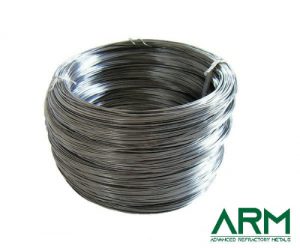Introduction
Zirconium wire has emerged as a vital material in marine environments due to its high corrosion resistance, excellent thermal stability, and robust mechanical strength. This article will discuss the advantages of Zr wire in marine settings, exploring its properties, applications, and the reasons behind its growing adoption.

Properties of Zirconium Wire
Zirconium is a transition metal known for several key properties:
- Corrosion Resistance: Zirconium exhibits superior resistance to corrosion by seawater, including both chloride and sulfate ions. This property is critical for materials exposed to marine environments, where corrosion is a primary concern.
- Mechanical Strength: The metal maintains its strength and integrity under mechanical stress, making it ideal for structural applications in marine settings.
- Thermal Stability: Zirconium can withstand high temperatures without degrading, which is essential for components exposed to varying thermal conditions in marine environments.
- Biocompatibility: The non-toxic nature of zirconium makes it safe for use in environments where it may come into contact with marine life.

Applications of Zirconium Wire in Marine Environments
Zirconium wire is used in various marine applications, where its unique properties contribute to enhanced performance and longevity:
1. Seawater Pumps and Valves
Seawater pumps and valves are essential components in marine vessels and offshore platforms. Zirconium wire is used in these applications to ensure the longevity and reliability of the equipment. The corrosion resistance of zirconium prevents the deterioration of pumps and valves, reducing maintenance costs and downtime.
2. Heat Exchangers
Heat exchangers in marine environments often deal with the transfer of heat between seawater and other fluids. Zirconium wire is utilized in the construction of heat exchanger components due to its thermal stability and resistance to seawater corrosion. This ensures efficient heat transfer and extends the lifespan of the equipment.
3. Underwater Sensors and Instrumentation
Underwater sensors and instrumentation are critical for various marine activities, including navigation, research, and resource exploration. Zirconium wire is used in these devices to enhance their durability and performance. Its resistance to corrosion and biofouling ensures accurate and reliable operation over extended periods.
4. Marine Fasteners and Connectors
Marine fasteners and connectors made from zirconium wire offer superior strength and corrosion resistance. These components are crucial in securing structures and equipment in marine environments. The use of zirconium wire ensures that fasteners and connectors can withstand harsh conditions without failing.
5. Fishing and Aquaculture Equipment
Zirconium wire is also used in the construction of fishing and aquaculture equipment, such as nets, cages, and hooks. Its biocompatibility and resistance to seawater corrosion make it ideal for prolonged use in marine environments, ensuring the safety and health of marine life.
Advantages of Zirconium Wire in Marine Applications
The use of zirconium wire in marine environments offers several significant advantages:
- Longevity: Zirconium wire’s resistance to corrosion and wear extends the lifespan of marine components, reducing the need for frequent replacements and repairs.
- Reliability: The mechanical strength and thermal stability of zirconium ensure the consistent performance of marine equipment under challenging conditions.
- Cost-Effectiveness: Although zirconium wire may have a higher initial cost compared to other materials, its durability and low maintenance requirements lead to overall cost savings in the long run.
- Environmental Safety: The biocompatibility of zirconium makes it safe for marine life, supporting sustainable marine operations and reducing environmental impact.
Conclusion
Zirconium wire is a superior material for marine environments, offering unmatched corrosion resistance, mechanical strength, and thermal stability. Its applications in seawater pumps, heat exchangers, underwater sensors, fasteners, and fishing equipment demonstrate its versatility and reliability.
As the demand for durable and efficient materials in marine environments continues to grow, zirconium wire is poised to play an increasingly important role in ensuring the success and sustainability of marine operations. For more information, please check Advanced Refractory Metals (ARM).
